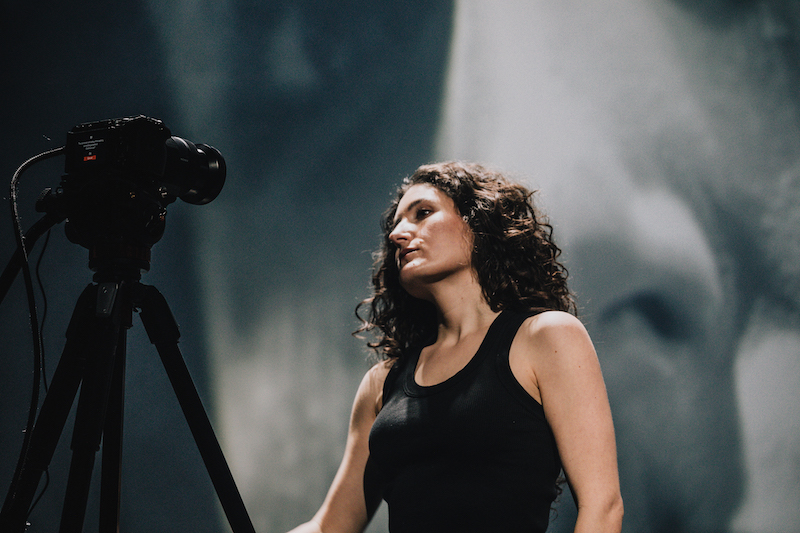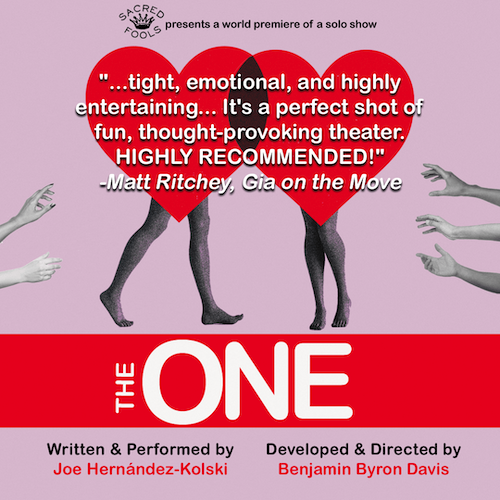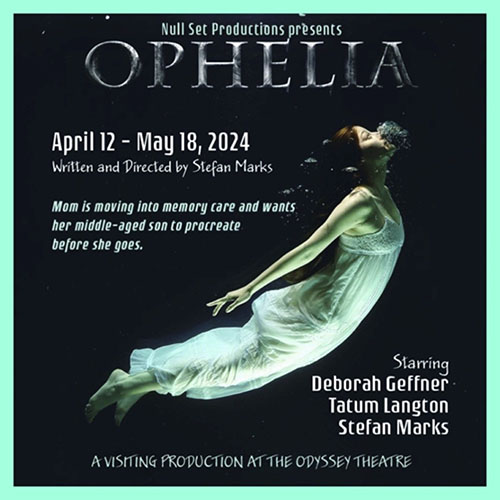Reviewed by Katie Buenneke
Pasadena Playhouse
Through February 11
“This show means nothing, you’re aware?” Kate Berlant remarks to the audience towards the end of her solo performance of Kate, now playing at the Pasadena Playhouse following acclaimed off-Broadway and off-West End runs. She’s not being quite fair to herself, and the audience knows it, but it’s fun to laugh as she details the insignificance of theater, the very thing we’re all here to see. It’s a defense mechanism Berlant is deploying, a theme that is threaded throughout the show.
Kate is a one-woman show, presumably autobiographical, though it presents a decidedly heightened version of reality. Berlant, with great intention, tells the audience that there’s a secret from her past, something that prevents her from acting naturalistically on camera, and — perhaps more importantly, at least to her — prevents her from being able to cry on cue.
Berlant and director Bo Burnham are preternaturally skilled in shaping the piece to be exactly what they want. Berlant meticulously controls what she’s showing the audience, which results in the show registering as much like an academic lecture on the history of acting styles as it does a comedy piece. It’s an erudite piece, full of references, some of which I caught, and many of which I could tell I wasn’t catching. And she’s very funny, with a tremendous sense of timing; each joke hits, and hits at the right moment.
Berlant and Burham deploy a Brechtian distancing effect that was difficult for me. Berlant spends much of the show mocking what others call her “big, crass style of indication,” and she does so by deploying — well, a big, crass style of indication, moving her body like a mime and contorting her face like Jim Carrey, in extreme close-up on a camera simulcast onto a massive screen on stage. But the about watching intentionally “bad” acting, especially for a long time, is that the experience is not all that different from watching unintentionally bad acting.
The show is at its most charming when it feels fresh and off-the-cuff, in the moments where Berlant breaks the fourth wall to address the audience. These moments are just as rehearsed as the rest of the piece, but the naturalism is a refreshing break from the hokier stuff the rest of the show is built on.
Throughout, Berlant gives the audience permission to laugh, both implicitly and explicitly. In a pivotal moment, she turns to the audience, vibrating with nervous energy and tells us that she’s about to reveal the secret she’s been keeping all this time — but tells us also, “you can laugh through this if you need to, like truly, no wrong responses.” In doing so, she’s creating a welcoming space for however the audience might process what she says next. But by setting up that she’s about to reveal a big, dark secret (something that frequently happens in solo performances) — and then having the secret actually being a punchline, something that provokes the audience to think, “that’s all?,” — it she sets the rest of the show on an insincere course from which it doesn’t return.
From the beginning, Berlant mocks the concept of solo performance, often maligned as just a way for the performer to excise some kind of trauma, regardless of how significant the audience might find said trauma. And while that can often be true, I’ve been lucky enough to see some incredible solo shows: Lorenzo Pisoni’s Humor Abuse, Mike Birbiglia’s The Old Man and the Pool, John Leguizamo’s Latin History for Morons, and recently Alex Edelman’s Just for Us. Each deployed humor and pathos as skillfully as Berlant does here, but with an undercurrent of sincerity, the absence of which I deeply felt in Kate.
There’s a great Ira Glass quote that came to my mind a few times while I was watching the show. He said, “All of us who do creative work, we get into it because we have good taste. But there is this gap. For the first couple years you make stuff, it’s just not that good. It’s trying to be good, it has potential, but it’s not. But your taste, the thing that got you into the game, is still killer. And your taste is why your work disappoints you.” Berlant is far from a beginner, but throughout, she wields her disappointment with herself as a cudgel, shoving “bad” acting in the audience’s face — labeling it so, as if to say the worst thing about herself so that no one else can say it about her. But instead of leaning into that insecurity with sincerity, she seems to be mocking the audience for thinking we might share a moment of catharsis with her.
Perhaps this is all a grand commentary on why audiences think we deserve that cathartic moment, why we think we’re entitled to the worst details of another person’s life. Maybe, at its core, it’s a castigation of the micro-industries that have sprung up around people, often women, who share terrible things that they endured for a pittance of money and/or attention, like the now-defunct xoJane’s It Happened to Me column series (full disclosure: I wrote one of those columns, and was paid $50 for it). I’m not so sure that is what Kate is, though; Kate might just be Berlant trying to subvert her insecurities about her acting by clouding the audience’s perception of what “good” acting even is. The show builds towards whether Berlant will be able cry on cue, in front of a camera, and — spoiler alert — she does. But she spends the rest of the show in tears that feel so affected that I couldn’t help but question her sincerity. as she cried, describing her love for the shared theatrical experience. It cheapened the experience for me; I felt as if I was being mocked for wanting to share this moment with strangers.
To me, Kate felt like a pretentious jerk at a party, asking if I’m enough of a yokel to enjoy a show like the ones she mocks, a show that wears its earnestness proudly —wouldn’t I prefer something detached, something cool? For me, at least, the answer is no; I prefer the vulnerability and communion that comes with sincerity to one weighed down with defensive derision.
Pasadena Playhouse, 39 S. El Molino Ave., Pasadena; Wed.-Fri. at 8 pm, Sat. at 2 and 8 pm, Sundays at 2 pm, through February 11. https://Pasadenaplayhouse.org. Running time: 75 minutes with no intermission














